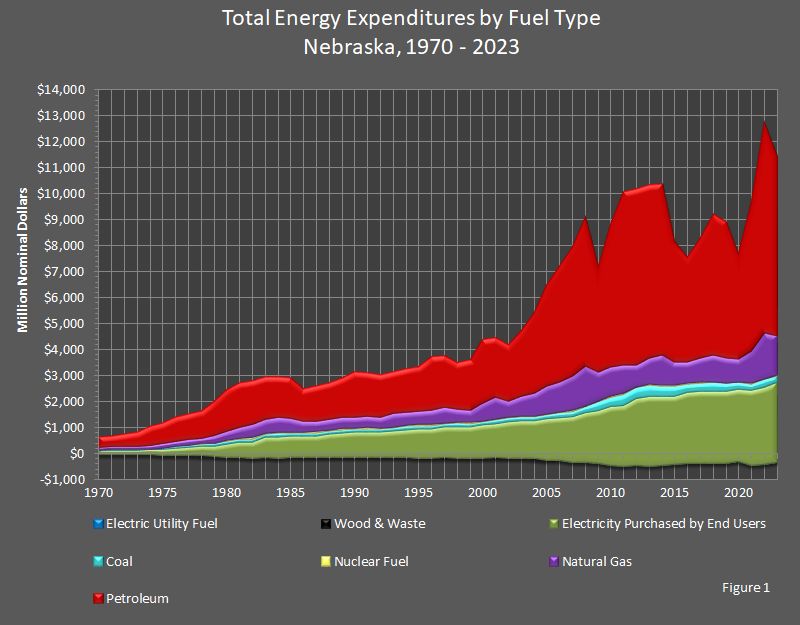Expenditures by Type of Fuel
Nebraska's total expenditures on energy decreased 10.4 percent to $11,410.1 million (or $11.4 billion) from 2022 to 2023. The first set of tables below shows that, in 2023, $6,837.0 million (or $6.8 billion) was spent on petroleum, $1,534.7 million (or $1.5 billion) was spent on natural gas, $260.8 million was spent on coal, $47.4 million was spent on nuclear fuel, and $12.4 million was spent on renewable energy. Wood and waste make up the cost associated with renewable energy since there are no direct fuel costs for hydroelectric, geothermal, wind, photovoltaic, or solar thermal energy, and expenditures on ethanol were not tracked.
Expenditures on petroleum were over half (59.9 percent) of Nebraska's total expenditures on energy in 2023. Thirteen–and–five–tenths percent (13.5%) of Nebraska's expenditures was spent on natural gas, 2.3 percent was spent on coal, 0.42 percent was spent on nuclear fuel, and 0.11 percent was spent on renewable energy.
Petroleum is divided into ten fuels or categories of fuels, as shown in the second set of tables below: distillate fuel made up 46.6 percent of petroleum, motor gasoline made up 44.7 percent of petroleum, lubricants (2.29 percent), propane (2.09 percent), jet fuel (1.94 percent), asphalt and road oil (1.89 percent), other petroleum (0.38 percent), aviation gasoline (0.08 percent), kerosene (0.007 percent), and residual fuel (0.006 percent).
Other petroleum includes sixteen (16) separate products, all of which are assigned to the industrial sector. The sixteen products are:
- aviation gasoline blending components;
- crude oil;
- motor gasoline blending components;
- natural gasoline, including isopentane;
- pentanes plus;
- petrochemical feedstocks, naphtha;
- petrochemical feedstocks, other oils;
- petrochemical feedstocks, still gas;
- petroleum coke;
- plant condensate;
- special naphthas;
- still gas;
- unfinished oils;
- unfractionated streams;
- waxes; and
- miscellaneous.
- Miscellaneous products vary from inexpensive (absorption oils similar to kerosene) to very expensive (hydraulic fluids) products. The greater part of the miscellaneous product line consists of finished petrochemicals, especially the aromatic hydrocarbons: benzene, toluene, and the xylenes.
Petroleum products are listed in the second group of tables below. The expenditures in both sets of tables are in nominal dollars to provide a better comparison.

| Attachment | Size |
|---|---|
| Total Expenditures 2010 - 2023 | 183.62 KB |
| Total Expenditures 1990 - 2009 | 155.94 KB |
| Total Expenditures 1970 - 1989 | 160.52 KB |
| Attachment | Size |
|---|---|
| Petroleum Products Expenditures 2010 - 2023 | 163.2 KB |
| Petroleum Products Expenditures 1990 - 2009 | 200.46 KB |
| Petroleum Products Expenditures 1970 - 1989 | 200.65 KB |
Sources: State Energy Price and Expenditure Report. Energy Information Administration, Washington, DC. Nebraska Department of Water, Energy, and Environment, Lincoln, NE.
Notes: There are no direct fuel costs for hydroelectric, geothermal, wind, photovoltaic, or solar thermal energy. Expenditures on ethanol were not tracked. There is a discontinuity in this time series between 1988 and 1989 due to the expanded coverage of non–electric utility use of wood and waste beginning in 1989. Totals may not equal the sum of the components due to independent rounding. NA indicates data not available.
1 Other petroleum includes the subtotal of sixteen (16) petroleum products consumed in the industrial sector.
